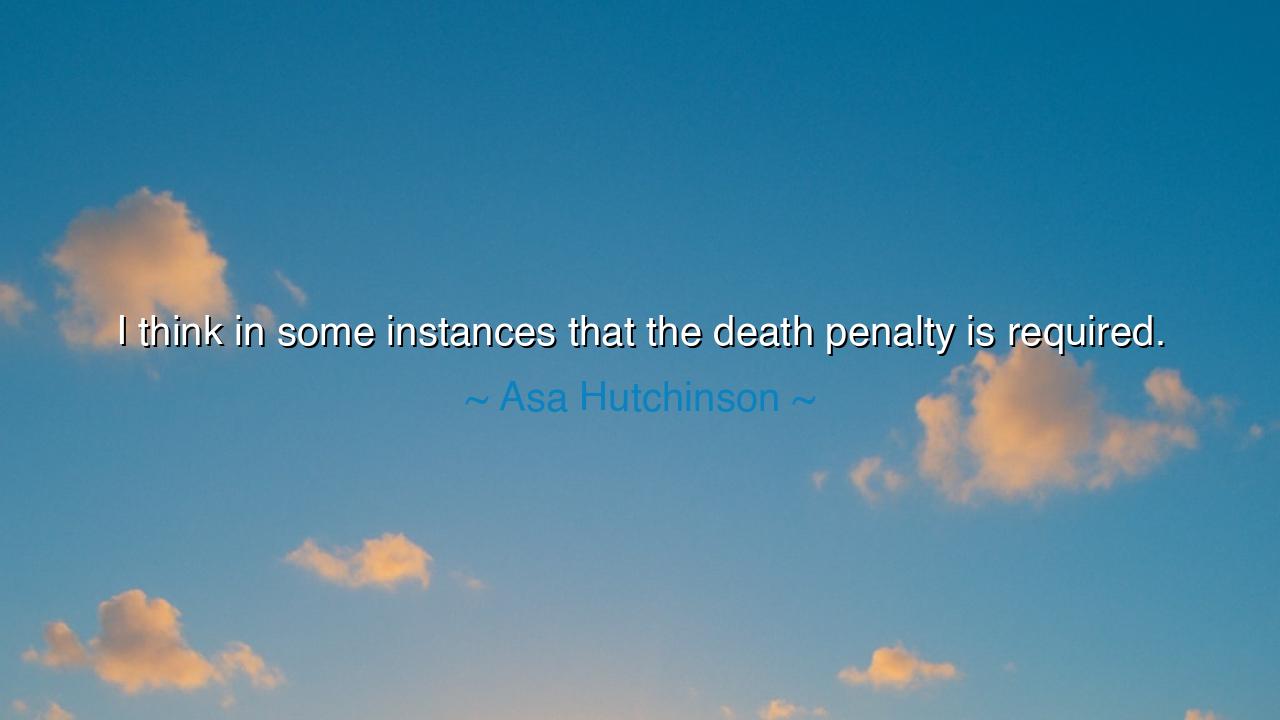
I think in some instances that the death penalty is required.






In the solemn words of Asa Hutchinson, former governor and statesman, we hear a declaration both heavy and deliberate: “I think in some instances that the death penalty is required.” These words do not come from recklessness, nor from a heart untouched by compassion, but from the ancient struggle that has haunted humankind since the dawn of law—the question of justice and mercy, of whether some deeds are so dark that life itself must answer for them. Hutchinson speaks not as one eager for vengeance, but as one burdened by the weight of governance, by the knowledge that the peace of a nation sometimes demands decisions that pierce the very soul of those who make them.
The origin of this quote lies in Hutchinson’s defense of the capital punishment system within the state of Arkansas, particularly during times of great controversy surrounding its use. His view, rooted in the traditions of American law and Judeo-Christian ethics, is that while life is sacred, the sanctity of law must also be preserved. To him, the death penalty is not a tool of cruelty, but an instrument of order—a somber acknowledgment that justice, in its most extreme form, mirrors the gravity of the crime. His words echo through time as a continuation of an eternal debate: when justice demands life for life, do we act as servants of righteousness or as agents of violence?
The ancients wrestled with this question long before Hutchinson’s age. In the Code of Hammurabi, one of the oldest known legal systems, the principle of lex talionis—“an eye for an eye, a tooth for a tooth”—was inscribed upon stone. It was not born of savagery, but of balance: a society’s attempt to ensure that punishment did not exceed crime, and that the scales of justice remained even. Similarly, in the laws of ancient Israel, the death penalty was prescribed for acts that shattered the moral order—murder, betrayal, blasphemy. Yet even then, the prophets and poets of that land cried out for mercy, urging restraint, warning that judgment belongs ultimately to God. Thus, from the very beginning, justice has walked hand-in-hand with sorrow, and the hand that delivers it has always trembled.
To understand the gravity of Hutchinson’s statement, one must consider the burden of those who have stood at the threshold of life and death—not as victims, not as criminals, but as judges. History remembers Marcus Aurelius, the philosopher-king of Rome, who loathed bloodshed yet upheld the execution of traitors to protect the empire. In his Meditations, he wrote, “What is just must sometimes wound.” This truth weighs upon every ruler who has ever signed a death warrant. It is easy for the crowd to cry for vengeance or for absolution; it is harder for the leader to see both the crime and the humanity of the criminal and still act in accordance with duty.
And yet, Hutchinson’s words carry an implicit warning: that if the death penalty is to exist, it must be wielded with reverence, never with haste or pride. To declare that such a penalty is “required” is not to rejoice in death, but to recognize that justice, when divorced from consequence, becomes hollow. The ancient Greeks spoke of Nemesis, the goddess who restores balance when human arrogance or cruelty upsets the natural order. The death penalty, in this light, can be seen as the human attempt to restore that balance—to say that the taking of an innocent life must not go unanswered, lest the moral fabric of society unravel into chaos.
But there is also another truth—one that Asa Hutchinson himself acknowledged through his careful words: that such decisions must always be rare and sorrowful, “in some instances.” For if justice is blind, mercy must be its other eye. The ancients taught that law without compassion turns tyrannical, and compassion without law dissolves into disorder. The wise ruler, therefore, must walk between them, never losing sight of the sanctity of life even as he defends it through judgment. The death penalty, in this sense, is not a celebration of punishment, but a lamentation of what mankind has become when such measures are deemed necessary.
So, my child of tomorrow, hear the lesson within these heavy words: justice must never be driven by rage, nor mercy by weakness. The decision to destroy must always weigh upon the soul of the destroyer. When you are called to judge—whether in small matters or great—remember the eternal tension between justice and mercy, between law and love. Seek balance. Act not from vengeance, but from clarity. For in every act of judgment lies the reflection of your own soul.
And let this truth guide you: to uphold justice is noble, but to do so with humility and compassion is divine. The world will always need its laws and its consequences, yet the heart must never grow numb to their cost. As Asa Hutchinson reminds us, there may be moments when the death penalty—that gravest of human decisions—is required. But even then, let it be carried out not as a sword of wrath, but as the final, reluctant toll of justice’s bell, ringing softly through the corridors of conscience and time.






AAdministratorAdministrator
Welcome, honored guests. Please leave a comment, we will respond soon